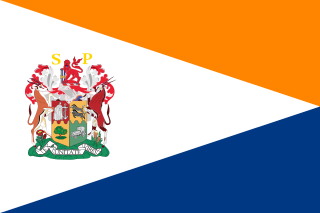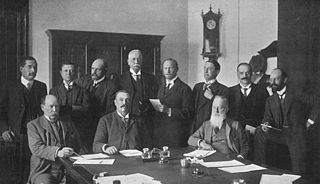Tricameralism is the practice of having three legislative or parliamentary chambers. It is contrasted with unicameralism and bicameralism, each of which is far more common.

The State President of the Republic of South Africa was the head of state of South Africa from 1961 to 1994. The office was established when the country became a republic on 31 May 1961, albeit, outside the Commonwealth of Nations, and Queen Elizabeth II ceased to be Queen of South Africa. The position of Governor-General of South Africa was accordingly abolished. From 1961 to 1984, the post was largely ceremonial. After constitutional reforms enacted in 1983 and taking effect in 1984, the State President became an executive post, and its holder was both head of state and head of government.

The Parliament of the Republic of South Africa is South Africa's legislature; under the present Constitution of South Africa, the bicameral Parliament comprises a National Assembly and a National Council of Provinces. The current twenty-seventh Parliament was first convened on 22 May 2019.

Pieter Willem Botha, was a South African politician. He served as the last prime minister of South Africa from 1978 to 1984 and the first executive state president of South Africa from 1984 to 1989.

The National Party, also known as the Nationalist Party, was a right-wing to far-right political party in South Africa founded in 1914 and disbanded in 1997, which was responsible for the implementation of apartheid rule. The party was an Afrikaner ethnic nationalist party, which initially promoted the interests of Afrikaners but later became a stalwart promoter and enactor of white supremacy, for which it is best known. It first became the governing party of the country in 1924. It merged with its rival, the SAP, during the Great Depression, and a splinter faction became the official opposition during World War II and returned to power. With the National Party governing South Africa from 4 June 1948 until 9 May 1994, the country for the bulk of this time was only a de jure or partial democracy, as from 1958 onwards non-white people were barred from voting. In 1990 it began to style itself as simply a South African civic nationalist party, and after the fall of apartheid in 1994, attempted to become a moderate conservative one. The party's reputation was damaged irreparably by perpetrating apartheid and it dissolved itself in 1997.
Elections in South Africa are held for the National Assembly, provincial legislatures and municipal councils. Elections follow a five-year cycle, with national and provincial elections held simultaneously and municipal elections held two years later. The electoral system is based on party-list proportional representation, which means that parties are represented in proportion to their electoral support. For municipal councils there is a mixed-member system in which wards elect individual councillors alongside those named from party lists.
The Senate was the upper house of the Parliament of South Africa between 1910 and its abolition from 1 January 1981, and between 1994 and 1997.

The Rhodesian Action Party (RAP) was a political party in Rhodesia formed in 1977 by a group of MPs from the Rhodesian Front (RF) who were dissatisfied by the leadership of Ian Smith and his attempts to negotiate an 'internal settlement' with African nationalists. Twelve members of the Rhodesia House of Assembly joined the party when it was launched in May 1977, including Ted Sutton-Pryce, Reg Cowper, Ian Sandeman and former Rhodesian Front chairman Des Frost.

General elections were held in South Africa on 29 April 1981. The National Party, under the leadership of P. W. Botha since 1978, lost some support, but achieved another landslide victory, winning 131 of 165 directly elected seats in the House of Assembly.

General elections were held in South Africa on 6 September 1989, the last under apartheid. Snap elections had been called early by the recently elected head of the National Party (NP), F. W. de Klerk, who was in the process of replacing P. W. Botha as the country's president, and his expected program of reform to include further retreat from the policy of apartheid. The creation of the Conservative Party had realigned the NP as a moderate party, now almost certain to initiate negotiations with the black opposition, with liberal opposition openly seeking a new constitutional settlement on liberal democratic and federalist principles.

The Tricameral Parliament, officially the Parliament of the Republic of South Africa, was the legislature of South Africa between 1984 and 1994, established by the South African Constitution of 1983, which gave a limited political voice to the country's Coloured and Indian population groups. The majority Black population group was however still excluded, their interests notionally represented in the governments of the black homelands, or "bantustans", of which they were formally citizens. As these institutions were largely politically impotent, its principal effect was to further entrench the political power of the White section of the South African population.

The New Republic Party (NRP) was a South African political party. It was formed as the successor to the disbanded United Party (UP) in 1977 and as a merger with the smaller Democratic Party. It drew its support mainly from the then Province of Natal, and tried to strike a moderate course between the apartheid policy of the ruling National Party (NP) and the liberal policies of the Progressive Federal Party (PFP).

The South Africa Act 1909 was an Act of the Parliament of the United Kingdom, which created the Union of South Africa from the British Cape Colony, Colony of Natal, Orange River Colony, and Transvaal Colony. The Act also made provisions for potentially admitting Rhodesia as a fifth province of the Union, but Rhodesian colonists rejected this option in a referendum held in 1922. The Act was the third major piece of legislation passed by the British Parliament with the intent of uniting various British colonies and granting them some degree of autonomy. Earlier, the British North America Act, 1867 had united three colonies and the Commonwealth of Australia Constitution Act, 1900 had united the Australian colonies.
The system of racial segregation and oppression in South Africa known as apartheid was implemented and enforced by many acts and other laws. This legislation served to institutionalize racial discrimination and the dominance by white people over people of other races. While the bulk of this legislation was enacted after the election of the National Party government in 1948, it was preceded by discriminatory legislation enacted under earlier British and Afrikaner governments. Apartheid is distinguished from segregation in other countries by the systematic way in which it was formalized in law.
Although the Democratic Alliance of South Africa in its present form is fairly new, its roots can be traced far back in South African political history, through a complex sequence of splits and mergers.
Black suffrage refers to black people's right to vote and has long been an issue in countries established under conditions of black minorities.
Jan Christiaan "Chris" Heunis, DMS was a South African Afrikaner lawyer, politician, member of the National Party and cabinet minister in the governments of John Vorster and P. W. Botha.

The Constitution of 1983 was South Africa's third constitution. It replaced the republican constitution that had been adopted when South Africa became a republic in 1961 and was in force for ten years before it was superseded by the Interim Constitution on 27 April 1994, which in turn led to the current Constitution of South Africa, which has been in force since 1997.

On 2 February 1990, the State President of South Africa F. W. de Klerk delivered a speech at the opening of the 1990 session of the Parliament of South Africa in Cape Town in which he announced sweeping reforms that marked the beginning of the negotiated transition from apartheid to constitutional democracy. The reforms promised in the speech included the unbanning of the African National Congress (ANC) and other anti-apartheid organisations, the release of political prisoners including Nelson Mandela, the end of the state of emergency, and a moratorium on the death penalty.

The National Convention, also known as the Convention on the Closer Union of South Africa or the Closer Union Convention, was a constitutional convention held between 1908 and 1909 in Durban, Cape Town and Bloemfontein. The convention led to the adoption of the South Africa Act by the British Parliament and thus to the creation of the Union of South Africa. The four colonies of the area that would become South Africa - the Cape Colony, Natal Colony, the Orange River Colony and the Transvaal Colony - were represented at the convention, along with a delegation from Rhodesia. There were 33 delegates in total, with the Cape being represented by 12, the Transvaal eight, the Orange River five, Natal five, and Rhodesia three. The convention was held behind closed doors, in the fear that a public affair would lead delegates to refuse compromising on contentious areas of disagreement. All the delegates were white men, a third of them were farmers, ten were lawyers, and some were academics. Two-thirds had fought on either side of the Second Boer War.














